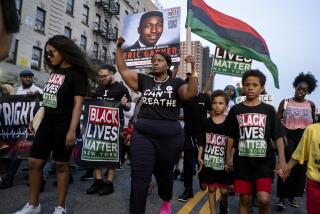Secret Postal Service Study Seeks the Violence-Prone : Attacks: Survey follows shooting episodes. Some Vietnam veterans fear possibility of unfair scrutiny.
- Share via
WASHINGTON — The U.S. Postal Service, which has experienced an extraordinary number of shootings and other violent episodes in its ranks, has begun a confidential and potentially controversial study to determine the type of employee most likely to commit such acts.
The study, coming in the wake of two separate shootings at post offices in Orange County and Michigan, has raised concerns among some workers--especially Vietnam veterans--that the postal service may be about to subject them to unfair scrutiny or impose unfair restrictions on them.
Officials of the Postal Inspection Service, an elite branch of criminal investigators who are conducting the psychological-profile study, declined to discuss it in detail Tuesday, saying that they first want to report their findings to congressional committees in the coming weeks.
It was unclear precisely how the information would then be used. But one official described the project as “very sensitive and subject to misinterpretation” by federal employees or the public.
Paul Griffo, a spokesman for the Postal Inspection Service, said officials hope the study will identify “eight or nine characteristics or common denominators” among employees who have been involved in shootings, assaults or threats of violence. The study began last month with an analysis of about 2,000 postal employees drawn from the files of the Postal Inspection Service, a list that was later winnowed to “a statistical sample” of 300 cases deemed to be representative of the larger group, he said.
Spokesmen for the American Postal Workers Union, the largest organization of postal employees, said they had heard rumors of such a study but had no verification from the Postal Service. They said the service would be better advised to try to reduce stress in the workplace, a condition that they said often leads to outbreaks of violence.
In the last 10 years, 34 people have been killed and 20 wounded in 12 post office-related shootings across the country. Job-related tensions or unstable employees were said by congressional investigators to be a factor in each case.
On May 6, Mark Hilbun, a discharged mail carrier with a history of psychiatric problems, allegedly stabbed his mother to death and fatally shot a former co-worker in the Dana Point Post Office.
Several hours earlier, a disgruntled postal employee in suburban Detroit opened fire in a postal service garage, killing one person and wounding two others before committing suicide. Both had served in the military, although their precise service histories were not clear.
Art Doherty, a Vietnam veteran who is the union’s director of industrial relations in Philadelphia, said that he fears veterans will be targeted in the psychological study because “veterans no doubt have been responsible for some of the violence.”
Doherty said that “it would be an insult” for postal officials to identify veterans as a group responsible for violence “just as it would be to identify blacks or Latinos or women or any ethnic or religious group.”
He added that “veterans should not be used as a scapegoat for an institution that is repressive, authoritarian and unwieldy and is rife with poor management.”
A Dana Point mail carrier, Bob Gandara, agreed that the study would evoke a strong negative reaction, although he said he doesn’t personally object to it.
“I know it’s going to bother people, not only in Dana Point, but in other offices,” Gandara said. “Those people who have just returned to work (after the May 6 shooting), they probably won’t enjoy hearing about this.”
“It doesn’t bother me personally,” he added. “If (the study) helps curb the violence, that’s great. But if they take this information and sit on it, they’re wasting a lot of man-hours.”
Griffo declined to say whether the study, which is nearly complete, had concluded that veterans pose a threat to their co-workers.
“That is an area that’s touchy, if you start identifying or singling out any one group as a threat,” Griffo said. “That is not what we’re looking at at all.”
Griffo said the study involved not only the highly publicized post office shootings in recent years but also hundreds of internal investigations of threats and assaults that never became public. He denied rumors among some postal employees that confidential lists have been prepared so that supervisors can identify “dangerous” workers.
“There is no list of names. There is no list of employees who fit the profile,” he said.
Griffo said that the 12-member task force working on the study plans to verify its findings with behavioral scientists, psychologists and criminologists before reporting the results to Congress.
An investigation last year by the House Post Office and Civil Service Committee found that some unstable people slip through Postal Service hiring procedures and urged tougher employment screening, and better training for supervisors. It also concluded that some supervisors misused their authority to “harass, coerce and intimidate employees” by means of “a paramilitary style of management.”
Presumably the Postal Service would use its psychological profiles to improve its hiring procedures and weed out unsuitable workers.
Former Postmaster General Anthony M. Frank stirred controversy earlier this month when he implied in a nationally televised interview that an impetus to hire veterans had caused some of the violent incidents.
Marvin T. Runyon Jr., the current postmaster general, has said that he wants to dismantle the militaristic tradition in the Postal Service.
Correspondent Frank Messina contributed to this story.
More to Read
Sign up for Essential California
The most important California stories and recommendations in your inbox every morning.
You may occasionally receive promotional content from the Los Angeles Times.









